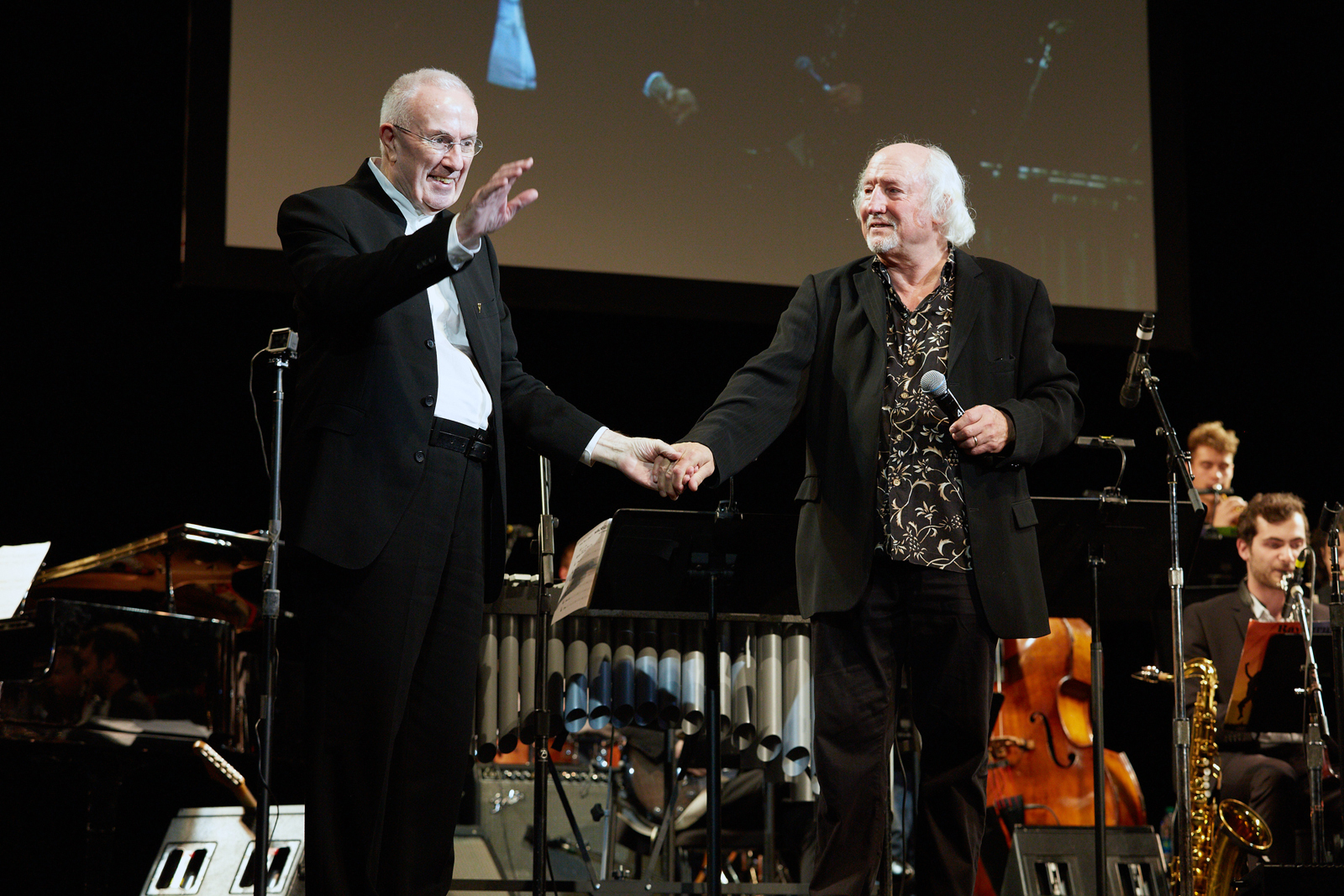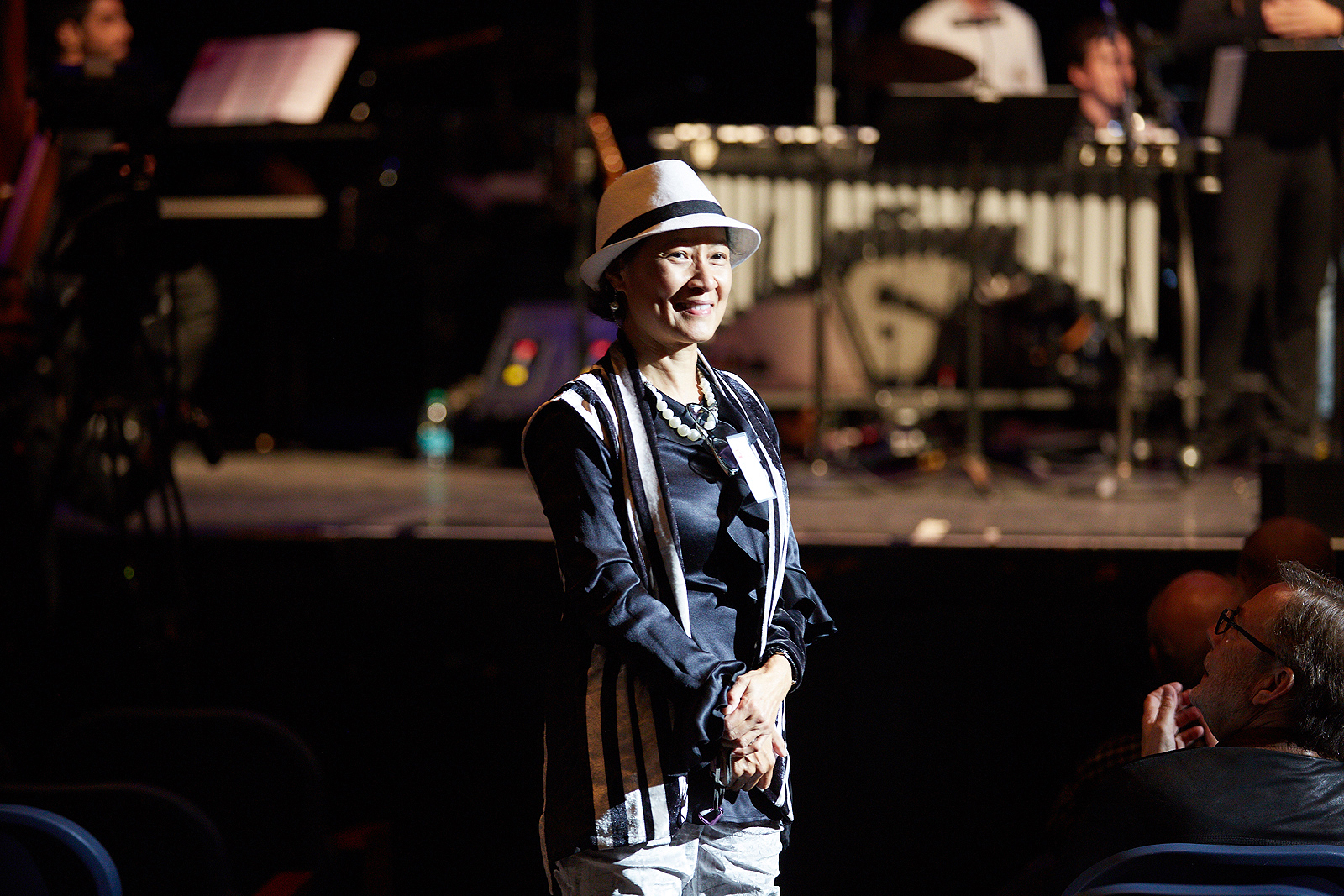Celebrating a Legacy

Michael Gibbs and Bill Frisell received Berklee honorary doctor of music degrees at an October 19 tribute to Gibbs. Left to right: Larry Simpson, Gibbs, Frisell, and Roger H. Brown.

Michael Gibbs (left) and music director Greg Hopkins acknowledge applause from the audience.

Ti Muntarbhorn ’80 was the executive director for the Gibbs concert tribute.

In the moment. From the left: Gary Burton, Jim Odgren, and Bill Frisell dig in to the music.
Gibbs was Berklee’s first composer in residence in 1974, and he left a lasting imprint on countless alumni during the decade that he taught at the college. Gibbs is known in the music world for his arrangements and orchestrations for epochal recordings by artists such as John McLaughlin, Peter Gabriel, Joni Mitchell, Pat Metheny, Elton John, Jaco Pastorius, John Scofield, Gary Burton, and more. Additionally, he has released more than a dozen albums of his own music and scored some 50 movies and TV productions.
The concert was also a homecoming of sorts for three generations of alumni and faculty members as well as retired Berklee president Lee Eliot Berk and his wife Susan. All were deeply affected by Gibbs’s music and his warm spirit through the years. Some crossed oceans and continents to recapture a bit of the ethos that energized the atmosphere at Berklee during the 1970s. Jazz-rock fusion was emerging then, and Gibbs’s musical voice was prominent on the recordings of some of the movement’s leading figures.
The moving force behind the concert was Sirabhorn “Ti” Muntarbhorn ’80, who came to Berklee from Thailand and became a student of Gibbs and a friend to his family. She spearheaded the planning and, as executive producer, coordinated details with many parties to make it a reality. The opportunity to play Gibbs’s music again at Berklee was enough to lure guitarist Bill Frisell ’77 to Boston and Gary Burton ’62 out of retirement in Florida. Professor Jim Odgren, who played saxophone for the original concerts, was also a featured soloist.
Professor Greg Hopkins served as the musical director and led the virtuosic students of the 19-piece Berklee Concert Jazz Orchestra in a program of music spanning Gibbs’s career from the 70s up to the present. Susan Berk commissioned the most recent work, titled “Fanfare” from Gibbs for the October concert. Susan and husband, Lee Berk, attended the first Only Chrome-Waterfall Orchestra in 1975 for their first date.
The program included older titles such as “‘The Time Has Come’ the Walrus Said,” composed for the retirement of Herb Pomeroy in 1995 and “Tennis Anyone?” among others. The program’s 11 selections also included pieces written by Bill Frisell, Eberhard Weber, and Charlie Christian as arranged by Gibbs.
The guest soloists were in fine form on their several spotlight pieces. On his original tune “Throughout,” Frisell showed hallmarks of his style with fluid double-stop lines and chiming harmonics with a spacious, crystalline Fender Telecaster tone. Burton really shined on Eberhard Weber’s “Maurizius” soloing over the band’s sumptuous sustained chord voicings. Burton also offered a special solo vibes rendition of Gibb’s “Sweet Rain.” Odgren dug into the blues changes of “Bennie’s Bugle” and wove lithe alto sax lines through the other numbers in which he was featured.
At the concert’s midpoint, president Roger Brown and senior vice president for academic affairs/provost Larry Simpson bestowed honorary doctor of music degrees upon Gibbs and Frisell. Introducing, Frisell first, Brown shared that the guitarist’s first professional gigs were with Mike Gibbs. Those led to subsequent work with John Zorn, Paul Motian, Elvis Costello, Joe Lovano, and others. Additionally Frisell’s distinctive guitar work has also been featured on film scores. “Bill is often cited as one of our culture’s most indispensable jazz instrumentalists,” Brown noted.
Of Gibbs, Brown said, “His name may not be widely known outside of jazz circles, but his influence on contemporary music from the jazz-rock fusion sound he pioneered to the generations of young artists and composers he inspired cannot be overstated.”
Later in the show, Gibbs took the baton from Hopkins and conducted two pieces. Throughout, Gibbs’s uninhibited harmonic language frequently dipped into dense dissonances. But in some instances, such as “Fanfare,” the music progressed out of darkness to end on a satisfying, consonant chord. Throughout, Gibbs’s music showed itself to be devoid of clichés. Gary Burton offered a tribute to his friend, stating, “Many arrangers and composers turn out work of the highest quality, but just a handful are notably original. Michael Gibbs absolutely belongs in that category. His music is always fresh and original and, frequently, breathtaking.”
Notable among the outstanding student soloists were trombonist Robert Max, guitarist François Chanvallon, saxophonists Jake Hirsch and Manuel Ramirez, and pianist Antoni Vaquer. During a second pause in the program, student Katie Essler joined Gibbs onstage, birthday cake in hands, and sang “Happy Birthday” accompanied by a Gil Evans-inspired arrangement written by Greg Hopkins.
The concert bookended a chapter that began 40 years ago, and culminated with a robust ovation for all participants. President Roger Brown observed, “This has been an amazing evening where the whole legacy of Berklee comes together in one place.”



